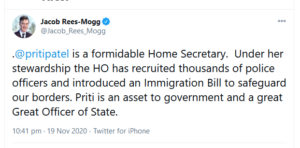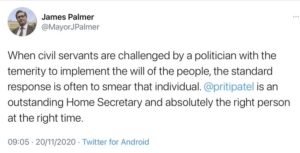 On the face of it this is a matter of workplace bullying, with one person having received a £25,000 payout in 2015, the looming prospect of an Employment Tribunal case and an enquiry showing that she broke the Ministerial code.
On the face of it this is a matter of workplace bullying, with one person having received a £25,000 payout in 2015, the looming prospect of an Employment Tribunal case and an enquiry showing that she broke the Ministerial code.
If this were simply a matter of a cabinet minister behaving badly they’d resign, the justice system would do its work, and things would move on.
Instead, there’s been a remarkable level of support from within government. Prime Minister Boris Johnson has chosen not to push her to resign, and there’s a claim that he “asked for Patel report to be palatable”. Jacob Rees Mogg tweeted:
Meanwhile, the elected mayor of Cambridgeshire and Peterborough, James Palmer tweeted:
and South Cambs MP Anthony Browne gave what’s been politely called a “car crash” interview defending her on Channel 4.
The implication is that bullying is OK. It isn’t.
At a very mundane level, the fact that there’s been one payout means a problem has been recognised. At this stage we don’t know what the Employment Tribunal will decide but the implication is that the law is not on Patel’s side. There’s a problem when law-makers decide they can break the law.
A deeper lens
My mind jumps from this to a comment on workplace bullying made in a discussion among members of the International Society for Psychoanalytic Study of Organisations, that “Earl Hopper’s fourth basic assumption is usually around when there is workplace bullying”. Demystifying that… the idea of “basic assumptions” is that, when a group acts as if people have agreed to behave in a particular way, without having discussed it, there’s something going on unconsciously. Hopper’s work draws together two other basic assumptions. One is that the group doesn’t really exist — which means people are behaving as if it is so unsafe that they can’t let themselves recognise it. The other is that it’s met for some higher purpose so the group itself doesn’t really matter. Hopper’s point is that these both deny the group itself.
At the moment, Priti Patel is in the headlines, but Dominic Cummings has been described in the same terms (David Lammy said “His legacy is one of bullying, deception, hypocrisy and hubris”).
From that perspective the defences of Patel should ring alarm bells, especially bearing in mind that one of the characteristics of workplace bullying is for the bully to blame their victim.
James Palmer’s tweet said:
“When civil servants are challenged by a politician with the temerity to implement the will of the people, standard response is often to smear that individual. @pritipatel is an outstanding Home Secretary and absolutely the right person at the right time.”
Is this a case of “the will of the people” being the “higher purpose” in this basic assumption? We talk of governments being elected, and having manifesto commitments, but these are not infallible. At the very least, they need to change when circumstances change. In December 2019 people voted for political parties — it would be hard to argue that they gave explicit support for all that Patel has been doing, and even harder to argue that they voted to allow a bully to bully.
The rub here is that civil servants bring enormous skill and competence. It goes against their professionalism to actively frustrate the government of the day, but a key part of their skill is bringing expertise to bear — and to be honest when ministers propose courses of action that won’t work. Justifying bullying when a civil servant does their job is serious — what it actually means is that an interpretation of “the will of the people” transcends all thinking and all sense of reality.
By contrast, a wise minister would hear the frustrations of the whole country and act in a way that addresses these and is rooted in actual reality. Non-partisan civil servants are vital in this to ensure that contact with reality, so policies are about making real differences and not engaging in flights of fancy.
Jacob Rees Mogg’s tweet is relevant. He praises Patel saying:
@pritipatel is a formidable Home Secretary. Under her stewardship the HO has recruited thousands of police officers and introduced an Immigration Bill to safeguard our borders. Priti is an asset to government and a great Great Officer of State.
The need to “safeguard our borders” implies that they haven’t been safe before that we’ve not been safe up to now, or face a new threat. There’s no evidence of either. But it could also imply a new anxiety — a sense that “we are no longer safe”. The irrationality of that goes back to the part of the “fourth basic assumption” that’s about the group not being safe — not because it isn’t safe, but because people’s fears are in the driving seat. A Home Secretary talking forcefully about imagined threats is a powerful motivator, but it needs to be done with a good grasp on reality. The horrific twentieth century example of this is the genocidal response of Nazi Germany to the “Jewish threat” that didn’t exist.
A wise Home Secretary — and a wise government — would draw on the expertise of civil servants to have a realistic assessment of the actual threats being faced by the UK, and find ways to address them. We’re in dangerous territory when it’s seen as acceptable for ministers to bully civil servants and to force through what they see as “the will of the people” rather than respond to the needs of the people.

